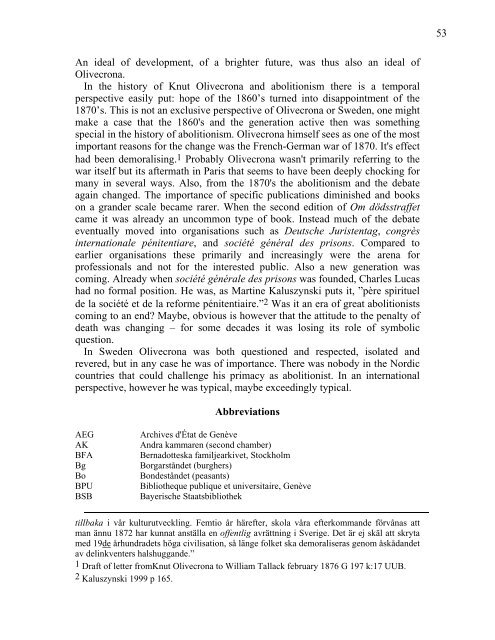Knut Olivecrona and his ”Om dödsstraffet”. - Figuras
Knut Olivecrona and his ”Om dödsstraffet”. - Figuras
Knut Olivecrona and his ”Om dödsstraffet”. - Figuras
You also want an ePaper? Increase the reach of your titles
YUMPU automatically turns print PDFs into web optimized ePapers that Google loves.
An ideal of development, of a brighter future, was thus also an ideal of<br />
<strong>Olivecrona</strong>.<br />
In the <strong>his</strong>tory of <strong>Knut</strong> <strong>Olivecrona</strong> <strong>and</strong> abolitionism there is a temporal<br />
perspective easily put: hope of the 1860’s turned into disappointment of the<br />
1870’s. T<strong>his</strong> is not an exclusive perspective of <strong>Olivecrona</strong> or Sweden, one might<br />
make a case that the 1860's <strong>and</strong> the generation active then was something<br />
special in the <strong>his</strong>tory of abolitionism. <strong>Olivecrona</strong> himself sees as one of the most<br />
important reasons for the change was the French-German war of 1870. It's effect<br />
had been demoralising.1 Probably <strong>Olivecrona</strong> wasn't primarily referring to the<br />
war itself but its aftermath in Paris that seems to have been deeply chocking for<br />
many in several ways. Also, from the 1870's the abolitionism <strong>and</strong> the debate<br />
again changed. The importance of specific publications diminished <strong>and</strong> books<br />
on a gr<strong>and</strong>er scale became rarer. When the second edition of Om dödsstraffet<br />
came it was already an uncommon type of book. Instead much of the debate<br />
eventually moved into organisations such as Deutsche Juristentag, congrès<br />
internationale pénitentiare, <strong>and</strong> société général des prisons. Compared to<br />
earlier organisations these primarily <strong>and</strong> increasingly were the arena for<br />
professionals <strong>and</strong> not for the interested public. Also a new generation was<br />
coming. Already when société générale des prisons was founded, Charles Lucas<br />
had no formal position. He was, as Martine Kaluszynski puts it, ”père spirituel<br />
de la société et de la reforme pénitentiaire.”2 Was it an era of great abolitionists<br />
coming to an end? Maybe, obvious is however that the attitude to the penalty of<br />
death was changing – for some decades it was losing its role of symbolic<br />
question.<br />
In Sweden <strong>Olivecrona</strong> was both questioned <strong>and</strong> respected, isolated <strong>and</strong><br />
revered, but in any case he was of importance. There was nobody in the Nordic<br />
countries that could challenge <strong>his</strong> primacy as abolitionist. In an international<br />
perspective, however he was typical, maybe exceedingly typical.<br />
Abbreviations<br />
AEG Archives d'État de Genève<br />
AK Andra kammaren (second chamber)<br />
BFA Bernadotteska familjearkivet, Stockholm<br />
Bg Borgarståndet (burghers)<br />
Bo Bondeståndet (peasants)<br />
BPU Bibliotheque publique et universitaire, Genève<br />
BSB Bayerische Staatsbibliothek<br />
tillbaka i vår kulturutveckling. Femtio år härefter, skola våra efterkomm<strong>and</strong>e förvånas att<br />
man ännu 1872 har kunnat anställa en offentlig avrättning i Sverige. Det är ej skäl att skryta<br />
med 19de århundradets höga civilisation, så länge folket ska demoraliseras genom åskåd<strong>and</strong>et<br />
av delinkventers halshugg<strong>and</strong>e.”<br />
1 Draft of letter from<strong>Knut</strong> <strong>Olivecrona</strong> to William Tallack february 1876 G 197 k:17 UUB.<br />
2 Kaluszynski 1999 p 165.<br />
53






